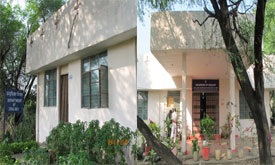About Department
Our Vision
The Department of Zoology aims to promote discovery and learning at all levels of
biological organization that includes molecular, cellular, organismal, population, ecosystem and
economics of the subject. Our course curriculum reflects the importance of strong disciplinary
and interdisciplinary approaches in research and teaching. We strive for excellence and synergy
in our coordinated programs of teaching, research, and service and produce students who are
well versed with the subject and are able to contribute to society and international community.
We clearly emphasize on biological literacy in our teaching and outreach programs.
Our Mission
Main focus of the Department is to promote the academic and research activities as well as
improve our understanding about living organisms, including their evolution, and their
environments.
Major Research Focus of the Department is in the field of Biochemistry, Cell and Molecular
Biology, Endocrinology, Reproduction Biology, Fish Biology, Toxicology & Neuroscience. We thrive to maintain a rigorous and comprehensive teaching curriculum to inculcate problem
solving and analytical abilities in our students. Our focus is that the course curriculum should
have broad applicability and foster the ability to adapt to the changing world of animal sciences.
We have introduced field learning component in our teaching program that has helped our
students to learn biological science skills in compelling ways. A series of lectures, workshops
and service activities are promoted at all the levels by the department.
The Department of Zoology was one of the first departments to be established by Guru
Ghasidas Vishwavidyalaya after its up gradation to the status of central university in the year 2009. Presently, the department has grown into a full-fledged center of teaching and research
excellence in field of animal biology. The Department of Zoology offers 3 years undergraduate (UG), 2 years postgraduate
(PG) and Ph. D. programs. Selections are made on the basis of all India Vishwavidyalaya
Entrance Test (VET). Department has adapted 100% CBCS system of evaluation for graduation
study and course syllabus has been upgraded for the same. The course structure and content
delivery methods provide substantial opportunities for interactive learning and exposure to
research. Many innovative teaching practices are the highlights of this program. Student's performance is assessed throughout the semester by a continuous system of
internal assessments, seminars, assignments, project reports and end-semester examinations. The
Department's main focus is in developing experimental skills through live experimental designs,
both by UG and PG students. The Department has teaching programs which focuses on the
uniformity principles of molecular and cellular mechanisms which amalgamates very nicely with
the classical aspects of the subject. We are fostering a new research program that will facilitate
the translational research, bringing clinicians and basic researchers together and providing a new
dimension to the ongoing research activities of the department. The departmental library contains a large number of books in all the major areas of the
subject. Books and journals especially in the thrust areas are purchased and cataloged separately
for use by the faculty and students. Apart from this, students and faculty members also use the
resources available at the university central library. We have an onsite museum of the
department that is very rich and contains specimens belonging to all the major animal phyla.
Museum also holds several models that are used for teaching and demonstration purposes. The Department research laboratories contain most of the instruments that are required
for smooth conduction theory and practical classes. Instrument room is well equipped with
several sophisticated instruments that are needed to carry out basic and applied research work.At present the department has 08 full time teaching faculty members who are actively
engaged in research and teaching in their respective field of specializations. Teaching faculties of
the department regularly present and shared their research work at various national and
international conferences and publishes their research findings in peer reviewed international and
national journals of repute. Collections of important findings are also submitted for patenting. Bringing laurels to the department and the university many research as well as post
graduate students of the department received prestigious awards from various national and
international scientific bodies.Major Research Areas
Our Teaching Strategy
